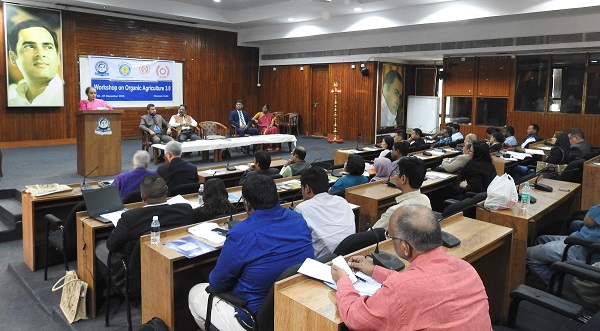
Select Page
The Asian Productivity Organization (APO) along with the Centre on Integrated Rural Development for Asia and the Pacific (CIRDAP), National Productivity Council of India, and Rajiv Gandhi National Institute of Youth Development (RGNIYD) organized a workshop on Organic Agriculture 3.0 in Chennai, 3–7 December 2018. The workshop aimed to create awareness of trends in organic agriculture, sustainable farming systems, and markets based on organic principles.
 The Organic 3.0 vision and strategy were developed by the International Federation of Organic Agriculture Movements (IFOAM)-Organics International to solve challenges in the food chain. They create farming processes that enable the production of healthy, affordable food for everyone. Organic 3.0 also minimizes environmental pollution and food contamination, enhances animal welfare, and ensures fairness for producers. Transparency and interdependence across food value chains and efforts to maximize efficiency in resource utilization are other hallmarks of the initiative. Organic 3.0 food and farming systems are more ecologically sound, economically viable, socially just, culturally diverse, and transparently accountable. The overall goal of Organic 3.0 is to enable the widespread adoption of truly sustainable farming systems and markets based on organic principles.
The Organic 3.0 vision and strategy were developed by the International Federation of Organic Agriculture Movements (IFOAM)-Organics International to solve challenges in the food chain. They create farming processes that enable the production of healthy, affordable food for everyone. Organic 3.0 also minimizes environmental pollution and food contamination, enhances animal welfare, and ensures fairness for producers. Transparency and interdependence across food value chains and efforts to maximize efficiency in resource utilization are other hallmarks of the initiative. Organic 3.0 food and farming systems are more ecologically sound, economically viable, socially just, culturally diverse, and transparently accountable. The overall goal of Organic 3.0 is to enable the widespread adoption of truly sustainable farming systems and markets based on organic principles.
In the keynote address, chief guest Padma Raghunathan, Chief General Manager, National Bank for Agriculture and Rural Development (NABARD), highlighted the importance of organic agriculture for the soil, ecosystems, and people and how organically produced food can contribute to a better life and health.
Raghunathan gave examples of different stakeholders, including financial institutions like NABARD, who are playing catalytic roles in promoting organic farming in India. She noted that sharing of experiences by delegates from different countries would provide learning for others and go a long way in taking organic farming to a different level across Asia and the globe. Professor A. Chandra Mohan, Registrar, RGNIYD, and CIRDAP representative Md. Zakaria also spoke at the opening session.
The APO workshop was attended by 22 participants from 13 member economies. It was conducted by six resource persons from PR China, India, the Philippines, and the USA. The overall focus was on the principles and values of organic agriculture and their implications, the revolution in organic agriculture, and the Organic 3.0 approach and goals.
The five-day program enabled participants to understand true-cost accounting, true value, and fair pricing for organic agriproduce, as well as Organic 3.0 food system models from around the world. The organic herbal village Thandarai in Chengelpet district and the natural herbal center operated by the Irula Tribal Women’s Welfare Society (ITWWS) hosted site visits.
The ITWWS is a women’s community-based development organization established in 1986 to protect natural resources, empower Irula women, and use local tribal knowledge of forest resources for economic prosperity. The village was specially designed for the conservation of medicinal plants. The center visited manufactures herbal medicines from plants and saplings grown organically. Herbal organic plant production and related enterprise activities were demonstrated to participants.
Photo: RGNIYD